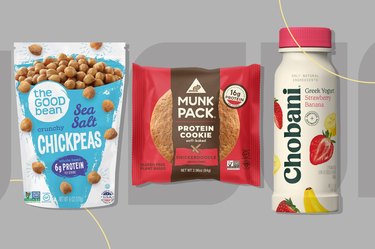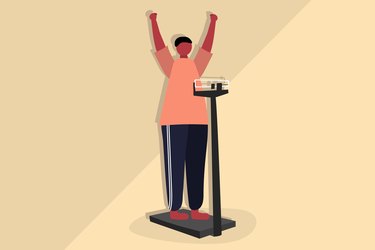
If you are assigned male at birth (AMAB) and weigh 300 pounds or more, you may be considered by certain metrics, like BMI, to have obesity.
And while your weight alone can't tell you much about your health, obesity is associated with a higher risk of certain health problems, including heart disease and type 2 diabetes.
Video of the Day
Video of the Day
Before adopting any weight-loss strategies for men, it's a good idea to talk to your doctor first. They can help you identify the best diet plan for you and the safest exercises to try, and they might even refer you to a registered dietitian and/or a mental health professional who can help support you along your weight-loss journey.
Once you've gotten cleared by your doctor, you'll want to follow these strategies for effective weight loss.
1. Estimate Your Calorie Needs
Adult men should typically aim for between 2,000 and 2,600 calories a day, according to the Dietary Guidelines for Americans. But if you're currently taking in more than this, you don't want to dramatically cut down on calories too quickly. (You can figure out how many calories you're currently getting by tracking what you eat in a calorie counter app or enrolling in an online weight-loss program.)
It's generally considered safe to cut your daily calories by 500 to 1,000 when you're trying to lose weight, according to Harvard Health Publishing. This can help you lose around 1 to 2 pounds per week. While that might not be as fast as you'd like your fat-loss diet plan to work, it's a safe and sustainable rate you can maintain for the long term.
Faster weight loss than this may also mean you lose a greater percentage of muscle, which can slow your metabolism and make it more likely you'll gain the weight back. Don't eat fewer than 1,500 calories per day, as this could cause your metabolism to slow down.
As you lose weight, your calorie needs will go down. You may need to recalculate your caloric needs multiple times over the course of your weight-loss journey to keep shedding pounds.
2. Adjust Your Diet
To cut your daily calories by 500 to 1,000 you can either exercise more or eat a bit less, thereby creating a calorie deficit.
To avoid feeling deprived and too hungry, focus on lower-calorie but nutrient-dense foods, such as whole grains, lean proteins, vegetables and fruits. These low-energy-density foods can fill you up on relatively few calories and help support weight loss, according to an April 2012 review in the Journal of the Academy of Nutrition and Dietetics.
Make sure all of your meals and snacks contain protein, which helps you feel full, according to a June 2015 article in The American Journal of Clinical Nutrition. Aim for 25 to 30 grams of protein per meal for weight-loss benefits. That might look like:
- 1 cup of quinoa with 3 ounces of tuna
- 3 ounces of chicken breast with 1 ounce of mozzarella cheese
- 1/4-cup dry-roasted soybeans and a cup of milk
3. Add in Exercise
Increasing the amount of exercise you get throughout the day will help you burn more calories and potentially speed up your weight loss, but you need to do it safely, especially if you've been sedentary for a while.
Talk to your doctor before starting an exercise program. They might recommend waiting until you've lost 10 percent of your current weight, according to the American Heart Association.
Cardio
When you are cleared to exercise, aim to get 30 to 60 minutes of low-intensity, low-impact exercise most days of the week, according to the Physical Activity Guidelines for Americans. This could be swimming, cycling, walking or anything else that gets your heart pumping that you enjoy. (Walking for 30 minutes at a moderate pace burns about 180 calories for a 300-pound man.) These options may be safer than high-impact exercise like basketball or running, which can stress your joints if you are carrying extra weight.
You can break exercise sessions into smaller blocks of 10 minutes or so and gradually work up to exercising for longer periods or at a higher intensity.
Strength Training
Aim for two resistance-training workouts per week that include exercises that focus on all of the major muscles in your body. Although resistance training doesn't burn a lot of calories, it can help make sure you lose mainly fat instead of muscle. The more muscle you have, the more calories you burn even when you're at rest, so resistance training can also support weight loss.
Modified versions of body-weight exercises can be a good place to start, such as sitting in a chair and getting up again, wall push-ups and stepping on and off of a step, and as you get more fit you can do more difficult versions.
Other beginner-friendly exercises include using soup cans or light weights to do arm curls, side arm raises and front arm raises, using heavier weights as your muscles get stronger. There's no need to use fancy exercise machines or get down on the floor if this is difficult for you.
A fitness professional can help develop a program tailored to your personal preferences and fitness level to help you safely retain muscle as you lose weight.
4. Get Plenty of Sleep
While you're adjusting your diet and exercise routines, don't neglect your rest. Skimping on sleep affects your hunger-related hormones, how your body stores fat and your willpower to make it to the gym. Aim for seven to nine hours a night during your weight-loss journey.
To kickstart better sleep, create a relaxing routine before bed with a calming activity like taking a warm shower or reading. Make sure your bedroom is cool, dark and quiet. Try to stop scrolling on your phone in the hour before bed. And get some natural sunlight first thing in the morning to help anchor your circadian rhythm.
5. Manage Stress
You could have less success with your tailored weight-loss plan if you're stressed. While some stress is unavoidable, too much stress can cause sleep issues, slow your metabolism and make it less likely you'll stick to your diet and exercise routines.
Ease stress and support your weight-loss goals by:
- Experimenting with different realxing activities, like meditation, breathing exercises or yoga
- Avoiding taking on extra responsibilities or work when you're overwhelmed
- Staying connected to your loved ones and reach out for support when you need it
- Finding a therapist
6. Consider Medication and/or Surgery
Depending on how much weight you aim to lose and your overall health, your doctor might consider you a good candidate for weight-loss medicine and/or weight-loss surgery. They'll help you weigh the pros and cons in your unique situation.
Weight-loss medicines can affect how your body stores fat or decrease your appetite, according to the National Library of Medicine (NLM). While they may help you lose weight quickly, many people regain the weight when they stop taking these prescription medications if they haven't adopted lasting lifestyle changes like the tips above.
Weight-loss surgery typically works by limiting how much you can eat or affecting how you absorb nutrients from food, per the NLM. You'll need to follow certain diet and exercise tips alongside the surgery to keep the weight off. And like any procedure, bariatric surgery has risks, such as blood clots or infections.
FAQ
Common Questions
How do you prevent loose skin when losing weight?
If you lose 100 pounds or more, you are likely to experience some loose skin. Your skin is less likely to sag if you lose the weight gradually, don't smoke and wear sunscreen.
How fast can a 300-pound man lose weight?
Losing more than 2 pounds a week generally isn't safe or sustainable, according to Mount Sinai. At this rate, if you want to lose 100 pounds, for example, it will take you about a year. If you want to lose 50 pounds, it will take you about 6 months.
How can you speed up your metabolism?
You can't simply "boost" your metabolism and watch the weight fall off. Instead, supporting your metabolism on the path to healthy weight-loss involves all of the tips above: Eat a balanced diet while cutting back on calories, exercise regularly, get plenty of sleep, manage stress and talk to a doctor, dietitian and/or trainer to help support your journey, according to the Cleveland Clinic.
- ACE: "Exercise Progressions for Clients Who Are Overweight or Affected by Obesity"
- ACE: "How to Give Your Overweight and Obese Clients the Best Chances for Success"
- ACE: "Caloric Cost of Physical Activity"
- Journal of the Academy of Nutrition and Dietetics: "Dietary Energy Density and Body Weight in Adults and Children: A Systematic Review"
- The American Journal of Clinical Nutrition: "The Role of Protein in Weight Loss and Maintenance"
- HHS: "Dietary Guidelines for Americans"
- Harvard Health Publishing: "Calorie counting made easy"
- AHA: "Understanding Extreme Obesity and What You Can Do"
- HHS: "Physical Activity Guidelines for Americans"
- NLM: "Weight-loss medicines"
- NLM: "Weight Loss Surgery"
- Mount Sinai: "Diet for rapid weight loss"
- Cleveland Clinic: "How To Increase Your Metabolism for Weight Loss"












